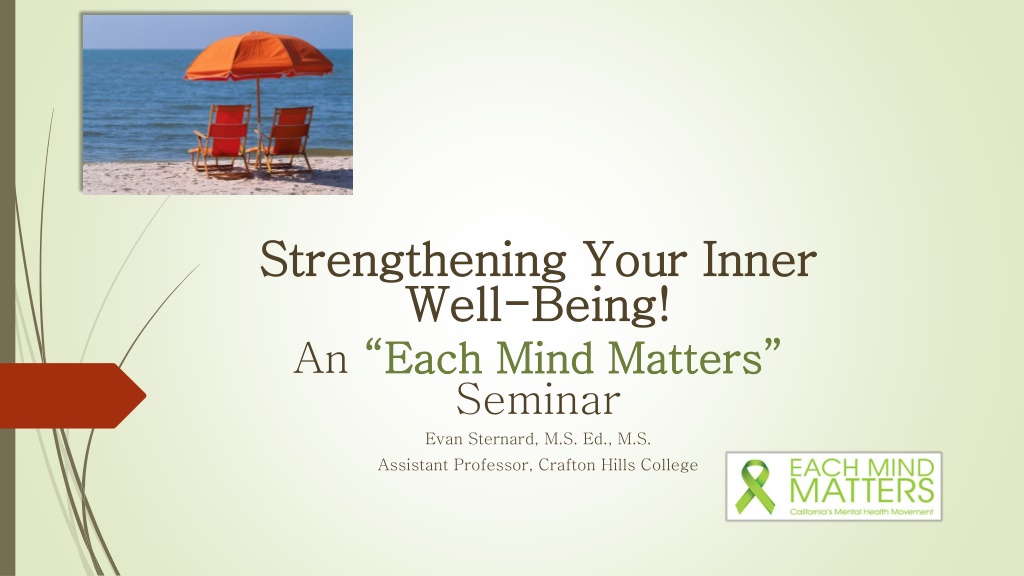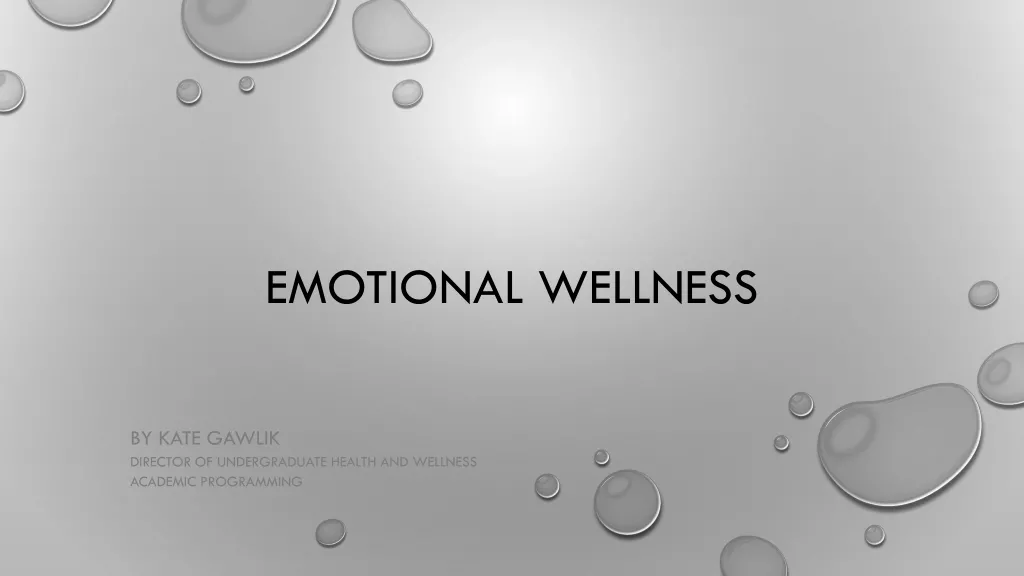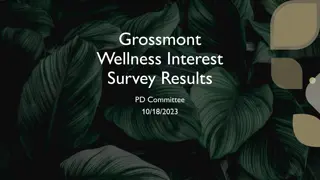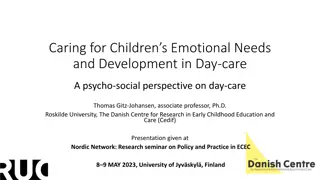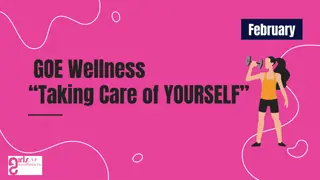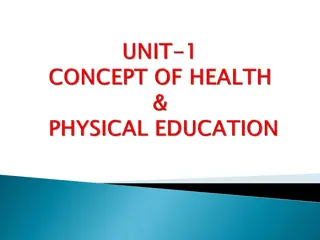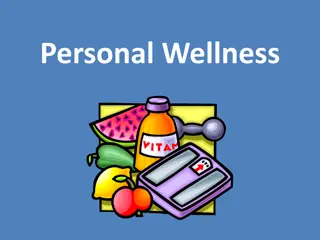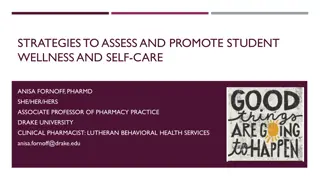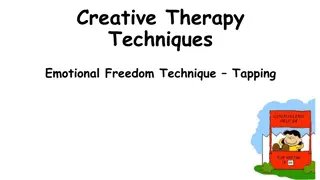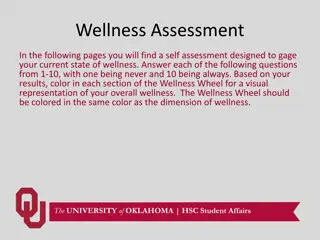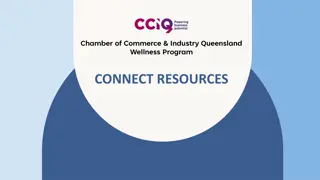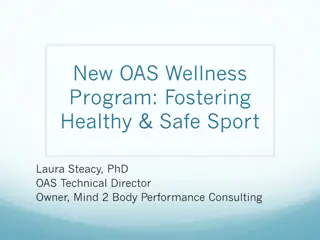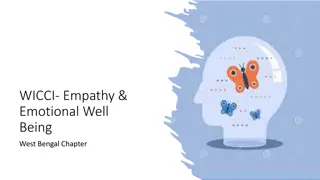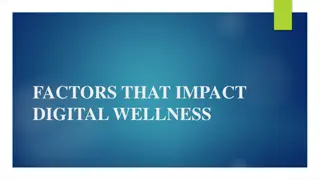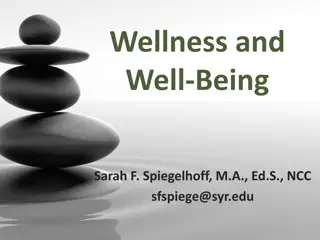Understanding Emotional Wellness for Inner Well-Being
Exploring the importance of emotional wellness in cultivating inner well-being, this content delves into the facets of social, mental, and emotional well-being. It emphasizes the significance of acknowledging and accepting our feelings, maintaining a positive outlook, and finding purpose and peace within oneself. Insights are provided on how emotional well-being plays a pivotal role in overall health, personal fulfillment, and connection to the world around us.
Download Presentation

Please find below an Image/Link to download the presentation.
The content on the website is provided AS IS for your information and personal use only. It may not be sold, licensed, or shared on other websites without obtaining consent from the author. Download presentation by click this link. If you encounter any issues during the download, it is possible that the publisher has removed the file from their server.
E N D
Presentation Transcript
Strengthening Your Inner Strengthening Your Inner Well Well- -Being! Being! An Each Mind Matters Each Mind Matters Seminar Evan Sternard, M.S. Ed., M.S. Assistant Professor, Crafton Hills College
Social and Emotional Wellbeing Health and wellbeing is Social and emotional more than just the wellbeing is an absence of an illness. It important life aspect, includes our physical health and has an impact on and safety, social and physical health, quality emotional health, spiritual of life and personal wellness and subjective achievements. sense of wellbeing.
Mental and Emotional Well-being: Whats In It For Me? Mental and emotional well-being Early childhood is essential to overall health. experiences have lasting, Positive mental health allows measurable consequences people to realize their full later in life; therefore, potential, cope with the stresses fostering emotional well- of life, work productively, and being from the earliest make meaningful contributions to their communities. stages of life helps build a foundation for overall health and well-being.
Mental and Emotional Well-being: If It s Not There Anxiety, mood (e.g., depression) and impulse control disorders are associated with a higher probability of risk behaviors (e.g., tobacco, alcohol and other drug use, risky sexual behavior), intimate partner and family violence, many other chronic and acute conditions (e.g., obesity, diabetes, cardiovascular disease, HIV/STD s), and premature death.
Characteristics of Emotional Wellness Emotional Wellness is the ability to be aware of and accept our feelings, rather than deny them; have an optimistic approach to life, and enjoy life despite its occasional disappointments and frustrations.
Inner Well-Being: A Deeper Dive Inner well-being comes from the connection and harmony between our inner life and the outer world. In other words: It is having inner peace It is the feeling of belonging and connectedness with the world It is about realizing and experiencing deeper meaning, and a sense of purpose, in the universe It is the feeling that we are part of something larger than the issues, stresses, and challenges of our everyday lives
Inner Well-Being (cont.) Your values, beliefs, principles, and morals help to define your The way to inner well-being inner self. Take time to consider involves acceptance of the what these are and if your behaviors and actions are in world and transcendence accordance and harmony with (going above or letting go) these factors. of our everyday By cultivating compassion, lives. Meditation, rituals, love, forgiveness, acceptance, yoga and other practices trust, kindness, empathy, can develop inner well- altruism, joy and fulfilment in being. our lives, we help our inner health.
Happiness Is All In Our Mind We are far more in control of our happiness and contentment than we usually realize! We must stop OUTSOURCING our happiness.
Eight Golden Tips for Emotional Wellness 3. Learn to accept the changes in your life. 1.Keep expectations of yourself and others realistic. Unrealistic expectations lead 4. Release the anger and to disappointment and the resentments. Or keep feelings of failure. carrying that baggage! 2.Develop realistic goals and set out to achieve them, one day at a time.
(More) Eight Golden Tips for Emotional Wellness 5. Surround yourself with 7. Take good care of your positive thoughts and (mostly) body. positive people. Gravitate 8. If you are experiencing toward people who are uplifting emotional difficulty, talk to and supportive and away from someone. those who operate in negativity. 6. Choose to be a good friend to yourself
Resilience The term resilience is Resilience is the capacity related to social and to deal constructively emotional wellbeing, with change or challenges, allowing a but is not exactly the person to maintain or re- same. establish their social and emotional wellbeing in the face of difficult events.
Mindfulness Mindfulness is the basic Mindfulness. It s a pretty human ability to be fully straightforward word. It present, aware of where suggests that the mind is we are and what we re fully attending to what s doing, and not overly happening, to what reactive or overwhelmed you re doing, to the by what s going on space you re moving through, here and now. around us.
The Power of Perception: What do your sunglasses look like? Sunglasses Analogy Stand outside on a sunny day, without sunglasses, and take a good look around. Notice how everything looks take it all in. Now, put on a pair of nice dark shades and take the same look around. Don t things look different? Your surroundings didn t change a bit, did they? So...what made the difference? Expectations, beliefs and assumptions (your Shoulds ) act as your life sunglasses. They alter the way you look at life s realities! (including Stress and what causes it) It was the way you looked at them!
What Are you thinking at Finals time? If you believe... Your goal is worth the effort College is supposed to be tough The only easy day was yesterday! You ve done this before and you can do it again Now...how are you feeling? If you believe... Professors shouldn t overload you College should be easier than this You can t have a big project in every class There has to be enough time to do all you need to do! How are you feeling?
Did your circumstances change? Certainly not! What changed was the way you looked at them what you thought about them! Perception Perception is Everything! Get the Picture? ?
Handling Depression: Staying Up When You re Feeling Down An Each Mind Matters Student Seminar Evan Sternard, M.S.Ed., M.S. Assistant Professor, Crafton Hills College
Depression in College Students: What the Numbers Show Depression is the most common health problem for college students. Over 39% of college students felt so depressed that it was difficult to function at least once during the 2016-2017 academic school year. Over 60% of college students have felt overwhelmed by anxiety at least once in the last 12 months. Around 31% of college students have seriously considered suicide.
What is Depression? Depression is a medical illness with many symptoms, including physical ones. Sadness is only a small Depression interferes part of depression. Some with your daily life and people with depression normal function. Don t may not feel sadness at ignore or try to hide the all, but become more symptoms. It is not a irritable, or just lose interest in things they character flaw, and you usually like to do. can t will it away.
What are the signs and symptoms of Depression? Persistent sad, anxious, or empty mood Feelings of hopelessness, pessimism Feelings of guilt, worthlessness, helplessness Loss of interest or pleasure in hobbies and activities Decreased energy, fatigue, being slowed down
More Signs and Symptoms of Depression Difficulty concentrating, remembering, making decisions Difficulty sleeping, early-morning awakening, or oversleeping Appetite and/or unwanted weight changes Thoughts of death or suicide; suicide attempts Restlessness, irritability
Its Great to Ask For Help! It can also lead to self- If you don t ask for help, medication with high- depression may get worse risk behaviors with their and contribute to other own serious health problems, while consequences, such as robbing you of the binge drinking and other academic and social substance abuse and enjoyment and success having unsafe sex. that brought you to college in the first place.
If I think I may have depression, where can I get help here at Crafton Hills College?? Health and Wellness Center Located in SSB-101 Mental Health Services Depression, stress testing and counseling, crisis intervention and short-term situational counseling* for relationship difficulties, anxiety, stress and depression. Licensed Marriage and Family Therapist available for psychotherapy. Every CHC student qualifies for eight (8) FREE Clinical counseling sessions at our Health & Wellness Center!
Support GroupsHelp, Encouragement and Support for You! Support Groups: A Sample Menu Evan Sternard, M.S.Ed., M.S. Stress Less Stress/Anxiety Management Layla Subhani, M.A., LMFT Goddess by Design Women s Support Group Layla Subhani, M.A., LMFT Meditation/Deep Breathing/Reducing Body Stress Julie Estrella, LMFT, PhD. ACTion Group: ACT Therapy and Mindfulness group for Anxiety & Depression For information contact Counseling at 389-3366 or the Health & Wellness Center at 389-3272
What Else Can I Do? Don t expect to get better immediately, but you will feel yourself improving gradually over time. Besides seeing a doctor Remember that, by and a counselor, you treating your can also help your depression, you are depression by being helping yourself patient with yourself succeed in college and and good to yourself. after graduation.
Self-Care for Depression Your counselor may teach you how to be aware of your feelings and teach you relaxation techniques. Use these when you start feeling down or upset. Avoid using drugs and at least minimize, if not totally avoid, alcohol. Daily exercise, spending time outside in nature and in the sun, and eating healthy foods can also help you feel better. Get enough sleep. Try to have consistent sleep habits and avoid all- night study sessions.
(More) Self-Care for Depression Break up large tasks into small ones, and do what you can as you can; try not to do too many things at once. Try to spend time with supportive family members or friends, and take advantage of campus resources, such as student support groups. Talking with your parents, guardian, or other students who listen and care about you gives you support. Try to get out with friends and try fun things that help you express yourself. As you recover from depression, you may find that even if you don t feel like going out with friends, if you push yourself to do so, you ll be able to enjoy yourself more than you thought. Remember that, by treating your depression, you are helping yourself succeed in college and after graduation.
What Can I Do to Help Myself? (Thoughts from fellow college students) I cycle, which helps, and I take long walks in the country. I try to keep active, even if that's just getting out of bed, washed and ready before 10am, so that the days don't become an endless blur of nothingness. I make lists of why I feel depressed, what I can change and how I can change it. Be kind to yourself. If you need 'me time', give it to yourself. You are worth it. I've made a list of things I usually enjoy, like knitting or playing the guitar, and I try to do little bits of these activities when I'm feeling low. [What helps is] surrounding myself with friends and family who understand without pointing it out, who treat me normally but recognize that everyday life can be a struggle sometimes.
